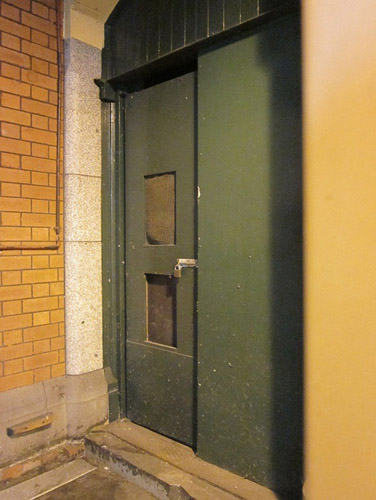SWANSTON STREET BRIDGE: STORIES
Carrying Cash on the Trains
Under the concourse on Platform 1 - the Strongroom
|
The entrance to the Strongroom is still there on Platform 1 just under the bridge. It has vaulted steel doors and still recognizable but not used. Everyone was paid in cash until the early 1980s. You could collect your wages from the pay office at Flinders Street or if you worked at Newport, the Parcels Coach would deliver the pay packages every 2nd Thursday after the morning peak. Wages to the various stations along the lines would be taken out in these safes once a fortnight. All the takings from the suburban stations had to be brought to Flinders Street every night to the Strongroom after the evening rush. There was a cash train for every line and every station had a revolver safely stored somewhere. The VR had registered cash escorts who carried a gun discretely hidden under their jacket and who would travel with the portable red safes. On the red or blue trains these safes were chained to the brake assembly in the guards van and on the Silver (Hitachi) trains they were chained to a special ‘D’ bracket welded to the wall of the guards van specifically for that purpose. The cash was placed in heavy leather bags and into the red safe and then dropped into the Strongroom at the station. Pistol training was conducted in the basement of Spencer Street Station. The guns were either 38 Smith & Westons or small Brownings. The IRO (Investigating Railway Officers) and the Victorian Police also used this facility for pistol training. Many retired ‘escorts’ reported that they would never have fired their weapon. A story survives from the 70s about the police investigating a murder and needing to examine the VR weapons. After examination the railway authorities were advised that none of the weapons should ever be fired. Like most things in the railways by then, maintenance had become quite lax. There was at least one reported hold up of a cash train. This occurred on the early morning Broadmeadows train at Ascot Vale in the late 70s/early 80s with the gunman taking the cash that was the employees’ fortnightly pay. |


